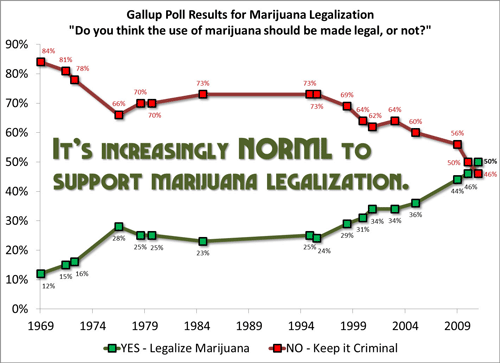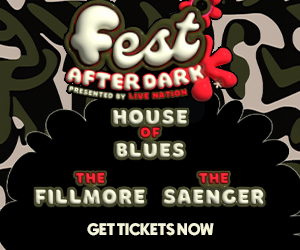I’ve never been accused of keeping my mouth shut on issued I think are important. In some ways, I’ve been ahead of the curve. Way ahead.
In February 2009, in my blog, I suggested that the city consider legalizing marijuana and prostitution to keep itself solvent. Alison Fensterstock, who was blogging for Gambit then, poked fun at the column—but I was deadly serious.
 Times are a’ changin’ quickly, though. Back in 2009 a Gallup poll claimed that 44 percent of Americans say they would favor marijuana legalization in their state and have it taxed as a way of raising revenue for state governments. According to the poll, public support for legalizing marijuana was fixed in the 25 percent range from the late 1970s to the mid-1990s, but acceptance jumped to 31 percent in 2000, and reached 44 percent in 2009. But in 2012, a Gallup poll revealed that 64 percent of Americans say that the federal government should step aside when states clear the way for marijuana legalization.
Times are a’ changin’ quickly, though. Back in 2009 a Gallup poll claimed that 44 percent of Americans say they would favor marijuana legalization in their state and have it taxed as a way of raising revenue for state governments. According to the poll, public support for legalizing marijuana was fixed in the 25 percent range from the late 1970s to the mid-1990s, but acceptance jumped to 31 percent in 2000, and reached 44 percent in 2009. But in 2012, a Gallup poll revealed that 64 percent of Americans say that the federal government should step aside when states clear the way for marijuana legalization.
In a poll conducted by NOLA.com, just a few days ago, 59 percent of respondents want to legalize marijuana use; 30 percent want to legalize marijuana sales; 7 percent want to lessen the penalties of offenders; 3 percent want to make penalties more stringent; and only 2 percent want to keep laws the same.
I don’t know where the respondents live, but I would venture to say that most of them live in the New Orleans metro area (considering the poll was on NOLA.com). It’s interesting to note that the majority want to legalize use of marijuana. The NOLA.com poll wouldn’t allow a duplicate choice of legalizing both the use and the sale of weed, and obviously, to relieve crime, you’d need to also legalize the sale of the product. Smoking marijuana is not a major factor in the commission of crime. Perhaps New Orleanians just want to smoke their pot and still have to obtain it from the drug dealer down the street (sounds pretty dumb to me). It would certainly solve a lot of problems if sales were decriminalized too. But at least legalization would have some impact on users going to jail. Putting users who haven’t commited a crime other than smoking in jail is beyond ludicrous.
I totally agree with marijuana legalization, but that’s not going to solve the problem of drug dealers and the crime that is a integral part of weed’s “distribution and marketing.” Only legalizing sales will do that.
It’s appalling to think that politicians have absolutely no moral imperative when it comes to this issue. They’d rather maintain the status quo of the “drug war” and keep telling us how marijuana is the gateway drug to hard narcotics (the gateway theory has never been proven, but it’s logical to assume—without benefit of a scientific study—that the younger a person is when he starts using weed, cigarettes or alcohol, the more proclivity there is for a progression to harder drugs. The moral is that kids should not be doing drugs of any kind anyway).
In a recently-released study, the ACLU indicted the current system for racially-biased arrests, as well as the horrific impact that such an arrest makes on a young person’s life. Quite simply put: a young person who’s arrested for using drugs and who goes to jail comes out of jail much worse than when he or she went in.
I know that I am preaching to the choir—the people who read OffBeat “get it.”
However, the bigger issue we all have to face is how do we convince the legislators of the states where we—who have the ultimate say on whether or not pot consumption and/or sales are legalized—to wake up and smell the smoke.
In a recent study done by LSU’s Manship School of Mass Communication, the researchers said that 56 percent of Louisiana residents are opposed to the legalization of marijuana use. About 42 percent support legalization (at least that’s a little progress.
New Orleans folk are obviously a lot more tolerant than their brethren throughout the rest of the state, since in recent legislation, the Louisiana Senate rejected House Bill 103 that sought to reduce penalties of repeat marijuana offenders. That bill would have lowered criminal sentences for marijuana possession convictions from five years in jail to two (for second offenders) and from 20 years in jail to five (for third-time offenders). According to the measure’s fiscal note, passage of HB 103 would have saved taxpayers $2.2 million in incarceration costs.
But in Louisiana, we still would rather have full prisons and convicted felons who can’t get jobs because of their convictions. Louisianans settle for ex-cons rather than productive citizens, albeit ones who make take a little toke now and again.




